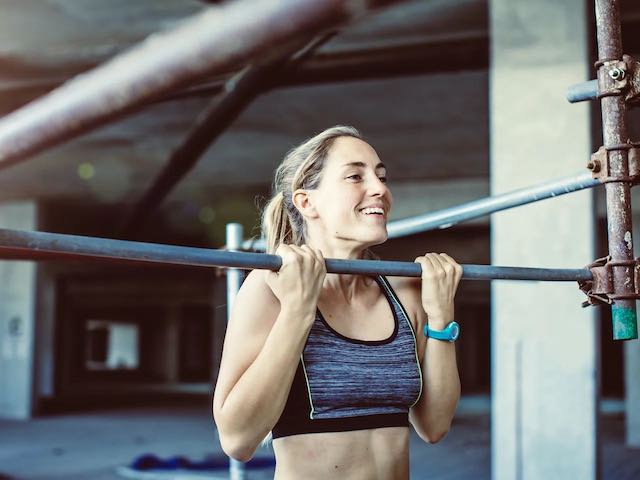The average Reps for chin-ups varies from person to person. There are soo many factors that come in such as workout goals, age, level of strength, endurance, gender and more. Below, all the factors will be considered in a chart form.
Chin up is a compound move that targets the upper body to work. It’s best to know which muscle is being targeted, which are:
- Traps (Trapezius)
- Lats (Latissimus dorsi)
- Rhomboids
- Teres Major
- Scapular & Shoulder Stabilisers
- Biceps
- Abdominals
- Forearms
(Check muscles used in more detail)
So what is the Average reps for Chin ups is?
The Average Chin up reps for Men is 8-20 reps.
The Average Chin up reps for Women is 3-12 reps.
Average Chin up Category Chart Men
| Category | Average Reps |
| Beginner | 1 – 4 Reps |
| Intermediate | 5 – 12 Reps |
| Advanced | 13 – 25 Reps |
| Elite | 26 – 50 Reps |
Average Chin up Category Chart Women
| Category | Average Reps |
| Beginner | 1 – 3 Reps |
| Intermediate | 4 – 8 Reps |
| Advanced | 9 – 13 Reps |
| Elite | 14 – 25 Reps |
- Must Read:- 10 Essential Back Machines for Building Back Muscle
- Must Read:- What is the Average Reps for Pull ups?
- Must Read:- What is the Average Reps for Push ups?
How many Chin ups should I do a day ?
After Performing chin-ups every day for some time, you need to know how many chin-ups you should perform a day. The answer varies from person to person as we all have different levels of pull fitness.
If you’re new(Beginner) to chin-ups then you should do 1-2 chin-ups every day for 3 sets. So, it’s 3-6 chin-ups in total.
If you’re doing chin-ups for some time (Intermediate) then you should do 3-8 chin-ups every day for 3 sets. So, it’s 9-24 chin-ups in total.
If you’re doing chin-ups regularly (advanced) then you should do 9-20 chin-ups every day for 3 sets. So, it’s 27-60 chin-ups in total.
If you’re a pro(elite) at chin-ups then you should be doing 21-50 chin-ups every day for 3 sets, So it’s 63- 150 chin-ups in total.
Benefits of Pull Ups

Chin-ups exercise has soo many benefits like physical health, appearance, building muscle, improving mood.
Improve over Physical health
Pull up exercise can be very beneficial to your overall health. As a 2012 study shows resistance training has improved overall health. All of it connects to better overall physical performance, control of movement, walking speed, and cognitive ability.
Builds Upper body Strength
Pull up is a compound exercise that help improves balance, reaction time and coordination. Most of the tension is on the upper body which makes it a great exercise for the upper body. One of the best exercises for working the whole upper body.
No Strain to the Joints
Pull up is a low-impact exercise that helps build strength and no strain to the joints.
Good for mental Health and Mood
A 2010 study shows that strength training exercises help with depression, sleep, anxiety and fatigue, and cognition in older adults.
How to increase your chin up?

1) Strengthen Upper body muscle such Shoulders, Arm Muscle, etc.
As you already know, chin up is a compound movement. It required different parts of your upper body muscle to work together. You may be finding it difficult to perform chin-ups due to a lack of shoulder and arms strength.
Train your upper body regularly, you can even train them at the end of your workout every day.
2) Improve your core
When performing chin-ups the abdominal muscle is used to keep the torso and legs stable during the chin up. During low-rep sets, the abdominals are activated more than any other muscle.
Train your core by doing some abdominal exercises regularly or at the end of the workout.
3) Hang on bar to increase your forearms and Grip strength.
Doesn’t matter if you’re pulling or pushing, Grip and Forearms strength is very important when it comes to any compound exercises.
Train your grip and forearms by doing grip exercises regularly or at the end of the workout.
4) Use resistance bands
Resistance bands can be very useful when it comes to increasing your chin-ups. All resistance bands do is assist you with your chin-ups. Over time you will build strength and correct form with your chin-ups will be able to do more reps without the resistance band.
An alternative for this is to use assisted pull-up machine as it will also help you without form and build strength over time if performed correctly and regularly.
How to do a chin-up with the correct form?

STEP 1 – Stand below a pull-up bar.
STEP 2 – Keep your Hand shoulder-width apart and place your hand in an underhand grip.
STEP 3 – Jump and grab the bar like your hanging. This is the starting position.
STEP 4 – Inhale, then exhale. Engage your core by pulling your belly button toward the spine and pulling the shoulders back and down.
STEP 5 – Raise your upper body toward the bar and pull your body using your arms and back muscle (making sure your chin is over the bar).
STEP 6 – Avoid swinging legs and shrugging the shoulders up. Ensuring that the shoulder blade remains back down throughout the exercise.
STEP 7 – Inhale and then have your elbow and body back down to the starting position.
Pull-Ups vs. Chin-Ups
Pull-ups and Chin-ups are both effective workouts for training the upper body. The main difference is the position of the hand. With pull-ups, you’re using an overhand grip where your hand is facing away from you which primarily target your lats and upper back muscle. With chip ups, you’re using an underhand grip where your hand is facing towards you (like a bicep curling position) which primarily targets biceps and chest muscle.
Conclusion
Chip ups are great exercises for upper back, bicep and core exercise. Compared to pull-ups, Chin-ups provide a greater range of motion. They are more accessible as it is easier to perform than pull-ups. If you planning to add some diversity to your training program then both chips ups and pull-ups are the way to go.

